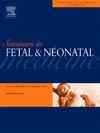改善产前接触毒品儿童的神经和心理健康结果。
IF 2.9
3区 医学
Q1 PEDIATRICS
引用次数: 0
摘要
产前药物接触是一个全球性的公共卫生问题,永远不可能完全消除。有些药物是孕产妇健康所必需的,但也有许多药物被用于娱乐和非医疗用途。合法和非法的成瘾性和依赖性药物都有可能对发育中的儿童造成永久性甚至是跨代的伤害,要了解成瘾性药物对儿童神经发育和心理健康的直接影响非常困难,而且受到许多社会、环境和可能的遗传因素的影响。此外,许多药物并不是明确的神经诱导剂,其对儿童的影响可能并不明显,在接触后很长时间才会被察觉。尽管如此,仍有许多机会可以改善儿童的最终结果,包括利用神经可塑性的巨大益处以及基本保健和支持的一般原则。本章将讨论目前对成瘾药物对成长中儿童的影响的理解,并提供可能的缓解策略以改善结果。本文章由计算机程序翻译,如有差异,请以英文原文为准。
Improving neurological and mental health outcomes for children with prenatal drug exposure
Prenatal drug exposure is a global public health problem that will never be completely eliminated. Some drugs are essential for maternal health but many others are used recreationally and for non-medical reasons. Both legal and illegal drugs of addiction and dependency have the potential to cause permanent and even intergenerational harm to the developing child and understanding the direct impact of drugs of addiction on child neurodevelopmental and mental health is difficult and confounded by many social, environmental and possibly, genetic factors. Furthermore, many drugs are not clear neuroteratogens and their impact on the child may be indolent and not appreciated for a long time after exposure has occurred. Despite this, there are numerous windows of opportunity to improve the eventual outcomes of the child including utilising the enormous benefits of neuroplasticity and general principles of basic health care and support. This chapter will discuss current understanding of the impact of drugs of addiction on the growing child and offer possible mitigation strategies to improve outcomes.
求助全文
通过发布文献求助,成功后即可免费获取论文全文。
去求助
来源期刊
CiteScore
6.40
自引率
3.30%
发文量
49
审稿时长
6-12 weeks
期刊介绍:
Seminars in Fetal & Neonatal Medicine (formerly Seminars in Neonatology) is a bi-monthly journal which publishes topic-based issues, including current ''Hot Topics'' on the latest advances in fetal and neonatal medicine. The Journal is of interest to obstetricians and maternal-fetal medicine specialists.
The Journal commissions review-based content covering current clinical opinion on the care and treatment of the pregnant patient and the neonate and draws on the necessary specialist knowledge, including that of the pediatric pulmonologist, the pediatric infectious disease specialist, the surgeon, as well as the general pediatrician and obstetrician.
Each topic-based issue is edited by an authority in their field and contains 8-10 articles.
Seminars in Fetal & Neonatal Medicine provides:
• Coverage of major developments in neonatal care;
• Value to practising neonatologists, consultant and trainee pediatricians, obstetricians, midwives and fetal medicine specialists wishing to extend their knowledge in this field;
• Up-to-date information in an attractive and relevant format.

 求助内容:
求助内容: 应助结果提醒方式:
应助结果提醒方式:


